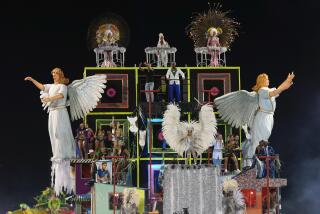Brazilian Troupe’s Steps Are Full of Fight
- Share via
Most people in the United States have heard of karate from Japan, kung fu from China, tae kwon do from Korea. But how many have heard of capoeira from Bahia?
Capoeira is a form of martial arts practiced for hundreds of years in Bahia, a northern state of Brazil, since the Portuguese first brought slaves from Africa. “Capoeira” also is the name of one of the dances to be performed Saturday at Orange Coast College in Costa Mesa by Brazil’s Bale Folclorico da Bahia.
The connection between dance and defense is no coincidence.
“Capoeira was used in Bahia as both a fight and a dance,” said the troupe’s general director, Walson Botelho, reached by phone before performances in Berkeley. “The slaves would practice this martial art, but when their owners asked them what they were doing, they always said that they were practicing dancing. In fact, they were training to fight. We had many slave revolutions.”
None, however, was successful.
“The most important was the Male Revolution, [which had been planned in the 17th century by all the slaves in Bahia,” Botelho said. “But one of the slave owners found out about it before it could happen. It was the revolution that didn’t exist.”
Capoeira, however, developed into something of a pastime in Bahia. Public demonstrations are common now, and kids perform it on street corners.
The company’s program includes works based on other types of slave dances, as well as sambas and dances that celebrate Carnaval, among them “The Origin Dance” and “Fisherman’s Dance,” “Samba de Roda” and “Samba Reggae,” “Ginga” and “Afixire.”
The 30-member Bale Folclorico da Bahia, which also includes singers and instrumentalists, attracted an audience of 50,000 at its European debut at Berlin’s Alexanderplatz Festival in 1992, and was singled out for praise from among 20 companies at the Biennale de la Danse in Lyon, France, in 1994.
The company’s first U.S. tour began in Rochester, N.Y., on Feb. 9, includes stops in New York City, Boston and Washington, and ends March 29 in Lincoln, Neb. (A troupe spokesman noted that one number using costumes that can expose women dancer’s breasts, OCC officials have requested that they wear tops under collars adorning their upper bodies. It’s the only stop among 17 cities where they’ll cover up.)
Botelho, who holds a degree in cultural anthropology from the Federal University of Bahia, cofounded the company nine years ago in Salvador, the Bahian capital.
“More than 10 million slaves came from Africa,” Botelho noted. “Even today Bahia has the greatest concentration of blacks anywhere in the world outside of Africa.”
*
According to Botelho, the link to Africa remains so strong that some gods no longer worshiped in West Africa continue to be acknowledged in Bahia.
He says that African culture in general is stronger in Bahia than in some parts of Africa. Yet that culture, and specifically the Candomble religion, was outlawed until recently. Though he has since turned to Candomble, Botelho, 34, was raised, at least outwardly, as a Catholic.
“Everybody now is giving validity to the black culture in Brazil,” Botelho said. “Zumbi, for instance, was the leader of an area where runaway slaves could live free and rich. The Portuguese government tried to finish Zumbi but never had success. He died in 1695, so last year was a big commemoration of 300 years.
“Zumbi is now our most important hero. Until last year, he was always the symbol of slaves, but not a hero. The black movement in Brazil is growing up.’
* Brazil’s Bale Folclorico da Bahia performs dances of African origin Saturday in the Robert B. Moore Theatre, Orange Coast College, 2701 Fairview Road, Costa Mesa. 8 p.m. $20 to $27. (714) 432-5880.
More to Read
Sign up for The Wild
We’ll help you find the best places to hike, bike and run, as well as the perfect silent spots for meditation and yoga.
You may occasionally receive promotional content from the Los Angeles Times.






